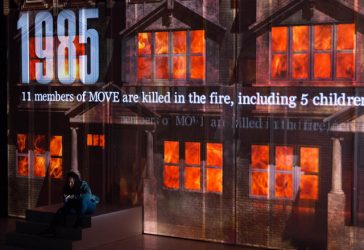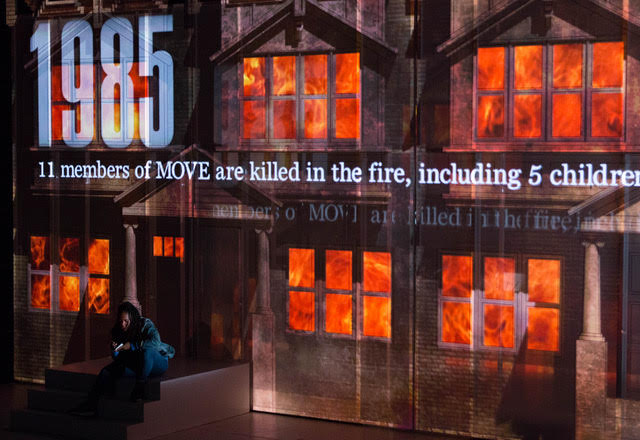 United States Roumain, We Shall Not Be Moved: Soloists, Opera Philadelphia Orchestra / Viswa Subbaraman (conductor). Opera Philadelphia, Wilma Theater, Philadelphia. Performance of 20.9.2017 reviewed as part of Digital Festival O. (RP)
United States Roumain, We Shall Not Be Moved: Soloists, Opera Philadelphia Orchestra / Viswa Subbaraman (conductor). Opera Philadelphia, Wilma Theater, Philadelphia. Performance of 20.9.2017 reviewed as part of Digital Festival O. (RP)

Production:
Director, Choreographer & Dramaturge – Bill T. Jones
Sets – Matt Saunders
Costumes – Liz Prince
Lighting – Robert Wierzel
Projection – Jorge Cousineau
Sound – Robert Kaplowitz
Broadcast Director-Editor – Michael Dennis
Cinematographer – Phillip Todd
Cast:
Un/Sung – Lauren Whitehead
Glenda – Kirstin Chávez
John Blue – John Holiday
John Little – Daniel Shirley
John Mack – Adam Richardson
John Henry – Aubrey Allicock
OG – Michael Bishop, Duane Lee Holland, Jr., Tendayi Kuumba, Caci Cole Pritchett
Voice of the Reporter – Pat Ciarrocchi
Caller – Michael J. Dees
I remember exactly where I was on 13 May 1985. It was a beautiful day in Philadelphia, where I was studying law at Temple University, and a constitutional law exam was top on my agenda. Afterwards, I returned to my Center City apartment and had dinner with a friend, Jan Taylor. From the television news, we learned that a bomb had been dropped from a police helicopter on a house in West Philadelphia. We went to the rooftop of the high-rise building in which I lived to watch the red glow of the flames and a plume of smoke rising as the sun set.
New to Philadelphia, I didn’t know much about MOVE, but I soon learned that this tragic event was just one chapter in the organization’s history. The philosophy of MOVE (the name is not an acronym), a black liberation group founded in 1972, combined revolutionary ideology with work for animal rights. A prior incident involving the group in 1978 resulted in the death of a police officer, injuries to several people and life sentences for nine members who were convicted of killing the officer.
The residents of the largely African American neighborhood in which the remaining MOVE members subsequently established their compound had qualms about the group’s presence in their community; there were complaints regarding trash, confrontational behavior and obscene political messages shouted from a bullhorn. An attempt to evict MOVE from the house on that fateful day turned into a standoff in which police fired over 10,000 rounds of ammunition at the house in under 90 minutes, fully aware that children were inside. The subsequent bombing killed eleven people, including five children, incinerated two city blocks and destroyed 61 homes.
Lawsuits dragged on for years. W. Wilson Goode, who was mayor of Philadelphia at the time, has repeatedly apologized for the bombing. On 13 May 2020, the thirty-fifth anniversary of the MOVE bombing, eleven Philadelphia City Council members issued an apology; called upon the city to observe an annual day of reflection, observation and recommitment to the principle that all people are created equal and endowed with inalienable rights to life, liberty and the pursuit of happiness; and asked all Philadelphians to work toward eliminating racial prejudices, injustices and discrimination. The current mayor issued a statement that there are no plans for the city to apologize for the bombing.
The 1985 MOVE bombing reverberates through We Shall Not Be Moved, a chamber opera by composer Daniel Bernard Roumain and librettist Marc Bamuthi Joseph, commissioned by Opera Philadelphia for the first Festival O in 2017. The opera is set, however, in 2013 when a budget crisis resulted in the closure of schools throughout the city. Most of the schools that were shuttered were in low income neighborhoods, thus disproportionately impacting children of color and their families.
In the opera, five teenagers from North Philadelphia, who have formed a family of sorts, are displaced by the school closings. The girl has taken the name Un/Sung and the four boys have all assumed the name John, in homage to John Africa, MOVE’s founder, who was killed during the 1985 shootout. All five teens are either brown or black, or identify as such. After John Blue shoots and kills a young man who has pulled a gun on his brother John Henry, they decide to slip away and seek refuge in West Philadelphia. They end up at 6221 Osage Avenue, which was the site of the row house that housed the MOVE compound.
No one would confuse either North or West Philadelphia with the city’s posher neighborhoods, which include Society Hill, Rittenhouse Square and Chestnut Hill. Most of North Philadelphia’s population is made up of African Americans and Puerto Ricans, with about half of the population living below the poverty line. Many of the blocks there are full of abandoned buildings and vacant lots, and the community is plagued by open-air recreational drug markets and drug-related violence. The Osage Avenue neighborhood bears similar scars; the houses destroyed in the fire were hastily and shoddily rebuilt and are now mostly abandoned.
We Shall Not Be Moved is, however, an opera, not a history lesson, and the focus of librettist Marc Bamuthi Joseph and director and dramaturge Bill T. Jones is on imperfect individuals in nearly impossible situations. The libretto neither sugarcoats the facts nor idealizes the six protagonists. All are wounded birds who hope and dream, but fate and destiny intrude. It is a story not so different from those set to music by Puccini, Verdi and Wagner. The extent to which Joseph and Jones weave the historical and social perspectives into the opera is nonetheless impressive. Longtime Philadelphia news anchor, Pat Ciarrocchi, serves as the narrator. She reported on MOVE throughout her career, and the sound of her voice added urgency and authenticity to the action.
The opera’s emotional tug of war operates on several levels, but the central conflict is between Un/Sung (the extraordinary spoken-word poet and performer Lauren Whitehead) and Glenda, the beat cop (the compelling mezzo-soprano Kirstin Chávez). Glenda, who is also from North Philly and long estranged from her family, takes pride in her job. She craves the acceptance of her fellow cops, a soft spot that Un/Sung zeroes in on, taunting Glenda that they aren’t her friends, let alone family, and noting that they haven’t even bothered to come look for her.
In the mayhem, Glenda accidentally discharges her gun, injuring John Henry (the pugnacious and rich-voiced Aubrey Allicock). She is disarmed and held hostage by John Little (Daniel Shirley was terrifying as he pointed Glenda’s gun at her head). It comes out that the young man killed by John Blue (the remarkable, sweet-voice countertenor John Holiday) was Glenda’s brother, Manny. Another of Glenda’s vulnerabilities is that she shot an unarmed teen, which is quickly unearthed in the verbal sparring.
Un/Sung sends the boys away so that she can deal with Glenda. When the two women are alone, the stage suddenly goes black. As in Götterdämmerung, the house goes up in flames and, as in the Wagner opera, the fire symbolizes rebirth, not an act of arson.
Daniel Bernard Roumain’s score is a mix of styles ranging from classical to hip hop, but he gets opera at a basic level: he composed music for arias and duets that amplify the text and reveal the characters’ emotions and inner turmoil. Evoking song writers as diverse as Erik Satie, Nina Simone, Frank Ocean and Sade, Roumain wrote songs that sing (one of the most moving was performed by the velvet-voiced baritone Adam Richardson as John Mack). Roumain’s music is accessible and listenable. Furthermore, it draws the listener into the drama.
The orchestra is compact – violin, viola, cello, piano/synthesizer, acoustic/electric bass and percussion – and up for the many stylistic curve balls that Roumain throws at it. Especially beautiful and haunting are the instrumental obbligatos in the arias. Viswa Subbaraman and members of the Opera Philadelphia Orchestra performed with the same commitment and emotional connection to the story as did the singers.
Bill T. Jones’ concept for We Shall Not Be Moved was focused and coherent. His choreography for the OG – the spirits of the original inhabitants of the MOVE house – was fluid and captivating. The dancers created an evocative air of mystery tinged with sadness as they glided about the stage. The entire cast responded to his touch, however, as the singers too moved with purpose and style when called upon to dance. Matt Saunders’ set was simple, but it perfectly established mood and locale. The outlines of the house on Osage Avenue, the most basic of his designs, lent an otherworldly atmosphere to a site linked to tragedies both past and present. Lit up in a myriad of colors, the house resembled a church or temple with blazing stained-glass windows.
In the accompanying introductory video, the opera’s creators discuss how We Shall Not Be Moved is very much an opera of the Obama era, as well as a response to the tragic shooting of Trayvon Martin and the Black Lives/Blue Lives Matter movements. As they point out, however, the opera speaks to today, especially in light of the disproportionate impact of the Covid-19 pandemic on people of color in the US. When their comments were being filmed, the world had not yet seen the video of the shooting of Ahmaud Arbery. Most chilling was the observation that this is the first stretch of time since 1999 and Columbine when there hasn’t been a school shooting. Even a pandemic has a bit of a silver lining.
Rick Perdian
We Shall Not Be Moved is available on demand through 31 August 2020. For more information click here.
